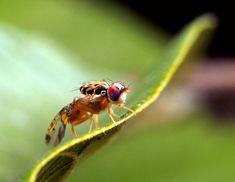
Despite the support delivered by the Common Agricultural Policy, European farmers do not have an easy time, having to comply with ever-stricter standards, not only imposed on them by national and European law, but also put in place by retailers.
Benito Orihuel works for a Spanish producer of fruits, vegetables and wine. His job is to make sure that all growers comply with an overall quality assurance system, to ensure fruits and vegetables meet the high standards required by retailers. Missing quality standards means losing business. “All farmers are constantly battling a range of pests and diseases to ensure they can deliver consistently high-quality produce to their very demanding customers,” says Orihuel. “Any failure means not only losing money on a returned order, but potentially losing all future business with that retailer entirely.”
The growers that Orihuel works with have their own system of Good Agricultural Practice, called Naturane. This formalises an approach they and the vast majority of farmers have been using for some time, called Integrated Pest Management, or IPM. This approach ensures the use of the most appropriate treatment at a given time to prevent or eliminate infestation of crop-damaging pests.
According to Orihuel, this is a minimum intervention, environmentally friendly system. “In our systems, we use natural predators of pests, pheromone attractants to lure pests away and other biological control methods wherever possible,” he says.
But there are not always biological solutions available, in which case farmers still need to use chemical pesticides. Used responsibly and where necessary, these are beneficial to the grower and the food chain. Unfortunately, pests adapt to pesticides over a period of time, particularly if farmers have very few to choose from.
Orihuel highlighted the difficulties in controlling Mediterranean fruit fly, which is a particular problem for growers of Europe’s 10 million-tonne annual citrus crop.
The fly leaves small, almost microscopic, holes when it feeds on the fruit, and these act as a route for fungal infections to enter. Seemingly perfect fruit are packed and dispatched to the retailer, but mould attacks a few in transit. Just one infected clementine per 1,000 can leave up to four per cent of bags containing rotting fruit, which will be rejected by the retailer.
Orihuel says: “Even with the control systems in place today, our growers lose over €1 million (£680,000) each year through damage caused by this pest.”
Pesticides used to control the Mediterranean fruit fly are being lost in the current harmonisation of EU legislation governing which pesticides a farmer can use and the tolerated residue limits.
In a few years, Orihuel is concerned that his growers may be forced to grow different crops, leaving European citizens dependent on imports from outside the EU. Post-harvest treatment with fungicides can safely control the mould problem, but these are believed to be under threat from the revised legislation.
The irony of the situation is not lost on Orihuel. “The net effect would be a likely reduction in production, and probably consumption of citrus in Europe, at a time when fruit and vegetable consumption is being encouraged, and our growers would lose out to their competitors outside Europe. It is ironic that legislation which is being introduced in the name of consumer safety could actually compromise healthy diets and hurt the southern European economy,” he says.
Fortunately, it is not too late for legislators to think again.
Farmers and growers also have hopes that new products will be brought to the market to help control pests which threaten Europe’s crops. The problem is that discovering, testing and getting approval for new active ingredients is a slow and expensive business (it typically costs some €200m to develop and launch a new product). Fewer crop protection companies are today willing to enter this process, given the high-risk investment that is needed. For major crops like cereals and potatoes, the market is large and the risk worth taking, but for more specialised crops like citrus, the economics are less attractive.
This difficulty is now being compounded by the revision of the EU regulation on pesticides. The already stringent requirements are likely to become even tougher, and the emphasis is increasingly put on hazard and risk, with little recognition of the benefits.
Orihuel is concerned that the main losers will be European growers. “The new legislation may make life more difficult for pesticide manufacturers, but it is really the growers of fruit and vegetables who stand to lose, as in many cases they will have no methods to effectively control the pests - and without the ability to control pests, they will not be able to supply the goods which Europeans demand.
“It is unlikely that consumers will face shortages, but they will be supplied from outside Europe by growers who may either face fewer pest problems or have access to a wider range of pesticides. It is difficult for me to accept such a situation that will only benefit farmers from outside the EU,” he adds.



